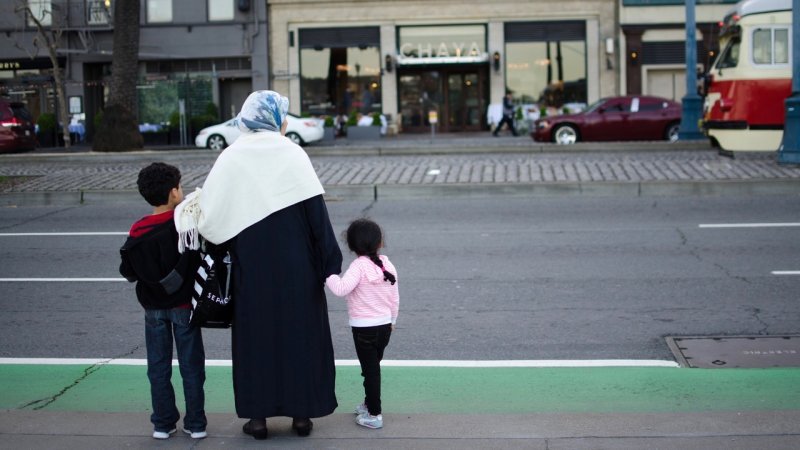In Germany, you do not need to be officially married to live with your partner and have children. Many still opt for marriage. To register your marriage in Germany you need to arrange a few things and prepare. Here, you will find everything you need to know before registering your marriage.
You must have a civil marriage to be considered officially married in Germany. Marriages which take place according to Christian, Muslim, Jewish -or any other - traditions and rituals have no legal weight if not followed by an officially recorded civil marriage. If a couple wish, they can register their marriage officially as well as traditionally. Foreign citizens who -according to the German law-have the right to join in wedlock may also marry in their home country's embassy. For more information in this regard, please contact the respective embassy. If you are a recognised refugee or asylum seeker, remember that you may lose your protection status and, consequently, your right of residence by visiting your home country's embassy.
In Germany, the Civil Registry Office ("Standesamt") is responsible for registering marriages. You can find and directly contact a Civil Registry Office near where you and/or your partner live. To register your marriage, you must fill out a so-called "Registration for marriage" form ("Anmeldung zur Eheschließung") and submit all the required documents. The form can be obtained from any Civil Registry Office. Even if you prefer to register your marriage in another German city, you still have to also register at the Civil Registry Office either at your place of residence or that of your partner.
You may apply at the Civil Registry Office six months before the desired date for the marriage (at the earliest). In some cases, you can reserve a specific date beforehand. If all the documents are ready and free dates available, the marriage can occur within a few days of application.
Both you and your partner have to be present for the registration of marriage. If one of you cannot be present, he or she can issue a power of attorney ("Vollmacht).
The first prerequisite of marriage in Germany is that you must be single, i.e. not already married to another person. Furthermore, you must be of legal age and legally competent ("Geschäftsfähig"). In other words, you must be able to decide with free will and understand the consequences of your actions.
Marrying close family members, i.e. grandparents, parents, siblings, children or grandchildren, is prohibited. The prohibition also applies to half-siblings and adopted children.
Since October 2017, same-sex couples can marry in Germany (“Ehe für alle”). You can read more about it in different languages in our chapter, LGBTQIA+ or in lebenspartnerschaft.de (in German).
When you file your application for marriage at the Civil Registry Office, in principle, you need to provide the following documents:
- A valid ID or a passport and a confirmation of registration (”Meldebescheinigung”)- this could be the passport issued from your country
- A certified copy of your family registry record (issued less than 6 months before the submission) or your birth certificate
- An extended registration certificate ("erweiterte Meldebestätigung"), which must have been issued less than 14 days before the submission
- In case you have been married before: a certified copy of the previous marriage certificate and the official divorce decree or the death certificate of the former spouse
Foreign citizens also need a so-called "Ehefähigkeitzeugnis" or a certificate of no impediment for marriage; a document which confirms that -according to the legislation of your home country - there is no obstacle to the planned union. You can apply for the "Ehefähigkeitzeugnis" at the relevant offices in your country of origin or your country's embassy. Many countries do not issue such a document, or do so in inadequate forms. In this case (or if you are stateless or unable to visit your home countries embassy because of your refugee status), you can apply for exemption from the aforementioned requirement at the relevant Higher Regional Court (“Oberlandesgericht”) via the respective Civil Registry Office. Such an exemption is valid for six months.
It may be that the Civil Registry Office responsible for you demands further papers. Please inquire directly and in advance at your Civil Registry Office about the necessary documents. The additionally required papers can vary from one office to another, so it makes sense to check the Civil Registry Office at your partner's place of residence and register there if they demand fewer documents.
Please note: Foreign documents must be translated and authenticated by the authorities in your homeland and also recognised by the German embassy in your country. The process is usually costly and time-consuming.
The costs of a civil marriage vary in different federal states. The desired day of the week and the number of required documents and certificates affect the price. In general, charges between €50 to €100 can be expected if you decide to get married on a weekday. If you want to marry on a Saturday, you have to reckon with higher costs.
Registering a civil marriage usually takes about 30 minutes. It must be held by a civil registrar and both partners must be present in person to declare that they wish to marry each other. The greetings, the inquiries of personal details, saying the “Yes-word” and putting your signature on the documents are mandatory parts of the marriage registration process. You can also exchange wedding rings, have witnesses, say marriage vows, and bring along musicians to the Civil Registry Office if you like.
You can certainly marry abroad. In the process, however, you need to follow the relevant German laws (see "Who Can Marry Whom?"), and the laws of the country in which you get married. Contact the authorities of the country concerned in advance and make sure you prepare the documents you need. The necessary documents usually include your passport, birth certificate, residence permit and the certificate of no impediment for marriage ("Ehefähigkeitzeugnis"). In principle, you need to translate all the necessary documents into the language of the respective country and have them officially certified before registering your marriage.
In some countries - like Denmark - you need fewer documents. That means, if you cannot obtain all the necessary papers for a marriage in Germany, it may be easier for you to register your marriage abroad.
If you marry abroad, you need to have your marriage officially registered in Germany as well. To do so, you must submit an application for a certificate of marriage to the relevant Civil Registry Office. You will also need to present your marriage certificate and, if necessary, a so-called "apostille". The apostille is an official document confirming the authenticity of the marriage certificate. All these documents must have been translated by a certified translator. You can visit justiz-dolmetscher.de or bdue.de to search for a certified translator. A couple who have married abroad are considered officially married in Germany only after they register their union in Germany.
If you get married abroad but cannot present a marriage certificate (and apostille), your marriage will not be recognised in Germany. If that is the case, you will have to register your marriage again.
Please note: If you get married abroad and your partner does not have a German residence permit, he or she must apply for a visa for the “Subsequent entry of spouse” ("Ehegattennachzug") at the German embassy. The prerequisites of such a visa, in principle, are a basic German knowledge of the applicant, as well as the partner's sufficient living space and adequate income (for covering the household’s expenses plus the health insurance fees of both partners) in Germany. Upon arrival in Germany, the spouse needs to apply for a residence permit at the relevant Immigration Office ("Ausländerbehörde").
In principle, your partner can come to Germany so that you can get married here. For that, the person living in Germany must apply to a German Registry Office for an appointment for the marriage to take place. The person living abroad must then apply for a national marriage visa, also known as a "Heiratsvisum", from the German diplomatic mission abroad. This is a national visa type D, which is different from a Schengen visa. A "marriage visa" is a visa for a long-term stay and is usually valid for three months. The marriage must then take place in Germany within this period and an application for a residence permit in accordance with § 28 Para. 1 No. 1 Residence Act must be submitted to the relevant Immigration Office. Otherwise, your partner may have to leave the country and re-enter later.
If you only want to get married in Germany but then live with your spouse in another country, you can also apply for a Schengen visa. You will find multilingual information on Schengen visa in our "Visitor visa" chapter.
You will need the following proof and documents for the marriage visa:
- A written confirmation of the date of the marriage
- A completed application form
- Basic German language skills level A1
- Copy of the residence permit and national passport of the person living in Germany; if the person is a German national, a copy of the German passport or identity card
- If applicable, a declaration of commitment from the spouse-to-be in Germany (covering the period between the date of entry to Germany and the date of the marriage)
- Proof of travel health insurance: for the first few weeks of the stay in Germany– one must apply for health insurance coverage in Germany afterwards.
- Certificate of unmarried status.
- If you were previously married, submission of the divorce decree with final judgement.
Depending on the case, further documents may be required.
Please note: If you and your partner have a child together for whom paternity is recognised and for whom you both provide joint care, obtaining a residence permit is also possible without marriage. You can find out more about it in our chapter "Born in Germany".
If you marry a person who holds German citizenship, you will not automatically be considered a German citizen, but you are entitled to a residence permit for three years if you and your partner both want to live together in Germany. After these three years, you can apply for a permanent residence permit, provided the necessary prerequisites (language skills, etc.) are met. Furthermore, you can apply for German citizenship after three years of legal residence (in Germany) and two years of marriage, provided all other requirements (Naturalisation Test, secure livelihood, etc.) are met. You can learn more in our chapter Naturalisation.
In case your partner does not have German citizenship, but rather a German residence permit (or a permanent residence permit), you are entitled to a residence permit for three years if you can prove that you have a basic knowledge of German language.
However, in principle, you will not receive a residence permit after the marriage, if:
- you have married, but are not together anymore.
- you have committed serious crimes for which you may be deported.
- a ban on entry and residence has been issued for you due to an earlier deportation.
Please note: If marriage is the sole justification for the entitlement of one of the partners to the right of residence (i.e. without marrying, you or your partner have to leave Germany or will be deported), the authorities may examine the marriage and its motives more thoroughly. The Immigration Office or the police can question you, your partner and your neighbours or make unannounced home visits to clarify if you are actually a couple or have just registered a so-called "marriage of convenience" ("Scheinehe") to obtain a residence permit. You can find a list of questions authorities may ask you (in German) at lawblog.de.
Family Name: Many people change their family names after the marriage. Couples can pick a new surname, or one can assume the birth name of the other. If one of the spouses adopt the other's family name, she can still add her own family name before or after her partners'. Alternatively, you can both just keep your own family names. If you opt for changing your family name, keep in mind the naming rights in your home country, as changing family names after marriage might not be recognised there.
Legal transactions: You can make purchases and payments which can also affect your spouse. However, this only applies to the transactions related to everyday needs such as the purchase of food, clothing or the transfer of monthly rent. For more significant business transactions (e.g. buying a car or a house) you need the consent of your partner.
Financial support: Spouses are financially responsible for each other. In other words, you have to support your unemployed spouse. The Social Welfare Office, the Employment Agency or the "BAföG office" (i.e. student loan office) will only approve your spouse's application for state benefits if you have little or no income.
Shared Custody: If you are married and have children together, you automatically share their custody with your spouse. For unmarried couples, only the mother has custody rights unless the couple stipulate joint custody at the Youth Welfare Office.
Family Insurance: If your spouse has little or no income, you can include them in your health insurance plan without paying any extra fees. Read more in our chapter health insurance.
Taxes: If you and your spouse have different levels of income, you can save money on income tax (the so-called "Ehegatten-Splitting"). You can learn more in our chapter Tax Declaration.
Surviving dependant's pension: If your spouse dies, you will receive financial support from the statutory pension insurance. This financial support is known as “Hinterbliebenenrente”.
Inheritance: If your spouse dies without leaving a will, you will automatically receive at least half of his or her assets. Furthermore, you pay less inheritance tax compared to an unmarried couple.
After a divorce or the death of a partner, there is often a lot to sort out. If you do not have German citizenship, you will often have to obtain a new residence permit. This is the case if you have come to Germany via family reunification because your partner was already living here.
If your spouse's residence is tied to your marriage, you may lose your right of residence if you separate. However, it is possible to remain in Germany under certain conditions. You can find out more about it in our chapter, "Independent right of residence for spouses ".
For many foreign citizens, it is easier to register their marriage abroad (e.g. in Denmark) because compared to Germany, couples need to submit fewer documents for registering their marriage.
Call Pro Asyl's Hotline at 069-242 314 20 and benefit from their legal advice in German and English.
These are the questions the Immigration Office will ask you and your spouse when they suspect your union is a "marriage of convenience" or "Scheinehe".




